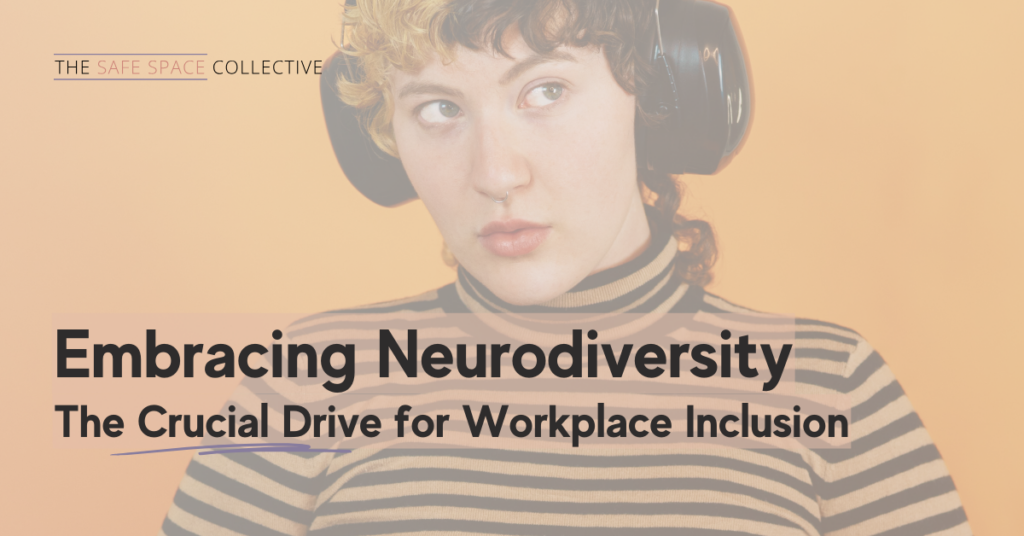As a leader in your workplace, one of your most significant responsibilities is ensuring that everyone in your team feels safe, supported and able to work their best. But for groups with neurodivergent members and people with ADHD, this sometimes requires a unique approach.
Supporting your staff with ADHD in the workplace is about more than just implementing a few strategies to help. It’s about understanding these individuals’ unique values and ensuring the workplace is comfortable, productive and compassionate.
The Safe Space Collective acts as the link between your neurodivergent staff and employers. This article explores what ADHD in the workplace can look like, including how to avoid discrimination and actively champion your neurodiverse workforce.
Facts and stats about ADHD in the workplace
Did you know that ADHD is one of the most common neurodivergent conditions that present to Australian GPs? With an estimated one in 20 Australians having ADHD — and many more undiagnosed — it’s vital for employers and leaders to get a better understanding of ADHD in the workplace.
With three main types of symptoms, including inattentive, hyperactive-impulsive, and a combination of both, you might not always notice if someone needs ADHD workplace support. So, it’s important to ensure that support is always there. Wondering if your employee has a neurodivergent condition and might need assistance? These signs could be an indication.
- Task lists are not being achieved. “You might find that a staff member has a task list that they’re working on but aren’t getting through because they’re distracted by other things,” Neurodivergent Advocate April Lea says. “That could be a sign of someone with a wandering mind or a mind that likes to go towards the things they’re most interested in.”
- They have recurring issues with lateness. Does your employee have issues turning up on time? It could be ADHD-related. “You might have an employee that’s often late to meetings, which can be a sign of time agnosia, which means they’re unable to perceive time,” says April.
- They are unable to meet deadlines. April also notes that someone with ADHD might struggle with deadlines, especially self-imposed ones. “They could be feeling crippled by the anxiety or realise that they’ve bitten off way too much, causing them not to hit the deadline,” she says. “Or someone who cannot effectively estimate when they will get a deliverable done.”
It’s important to note that not everyone feels comfortable disclosing that they have ADHD in the workplace. And that’s okay. As a leader, it’s up to you to do everything possible to provide inclusive support for your team, including those with neurodivergent conditions.

What does ADHD discrimination in the workplace look like?
Individuals with ADHD might experience work and their workplace environments differently from others. This can lead to misunderstandings and sometimes even feelings of discrimination.
ADHD is classified as a disability, so your employees’ rights are protected by the Disability Discrimination Act 1992 (DDA). When it comes to ADHD in the workplace, this means these employees can request reasonable adjustments that help them work more comfortably and productively.
According to April, one critical difference for someone with ADHD has to do with their executive function, which comes into play often at work. “People assume that things like self-organisation happen naturally and innately, but it’s actually heavily governed by your dopamine processing,” she says.
“In the ADHD brain, it’s processed differently. The interest needs to be there to get the dopamine going for the brain to start firing and the person to start doing things.”
For your employees with ADHD, the workplace presents challenges for staying focused and motivated that your neurotypical staff might not face. So, actively ensuring that they’re supported is vital. “Many people think it’s as easy as just telling someone with ADHD to try harder, but that’s not how it works,” April says.
April also notes that people with ADHD are more likely to experience microaggressions in the workplace rather than direct bullying. This can look like someone telling them to try harder, stay on task or turn up on time for a meeting and then being penalised when they can’t.
“A lot of these things are outside their control,” she says. “Usually, they’re trying hard to control them but just aren’t meeting the mark.”
With this understanding, we can move towards a future where ADHD in the workplace is supported rather than misunderstood.

ADHD in the workplace: strategies to help your neurodivergent staff
There are loads of benefits to having a neurodiverse workforce, including having people with ADHD in your teams. Research shows they bring several unique advantages to work, including creativity, innovation, curiosity and out-of-the-box thinking. However, to make the most of their ADHD strengths in the workplace, you need strategies to support them. They include:
- Educating your team on ADHD. “There’s so much misinformation, prejudice and preconceived notions about what ADHD is,” April says. “Working against misinformation is probably the most important thing an organisation can do.” Update your intranet, hold an information session and make free resources available that educate employees about neurodiversity.
- Remembering the human. “Managers and leaders should always be curious about what might be happening behind the scenes for their staff,” April says. “This means looking at the root causes of behaviour, rather than the behaviour itself.” If you think one of your employees is struggling, start a conversation.
- Being an advocate. “As a manager, you should strive to build accommodations for all staff members,” April says. “This helps create a safe space where people feel accepted and understood.” Be proactive and listen to the needs of your employees.
- Getting in touch with Safe Space. At Safe Space Collective, we partner with employers and employees to provide genuine, usable resources and tools that help neurodivergent people feel at ease at work. We’re a great place to start if you’re unsure how best to support someone with ADHD at work.
Whether you have an employee who’s actively disclosed their ADHD or you want to show your support to all employees, it can make a world of difference to implement these simple tips.
Helping your whole team thrive
There are countless benefits ADHD employees can bring to their teams and the broader organisations they work for. So, it’s time to start supporting them in doing their best. The Safe Space Collective bridges the gap between employers and employees so that neurodiversity is embraced. Sign up for a free, seven-day trial and explore the available resources and tools.



